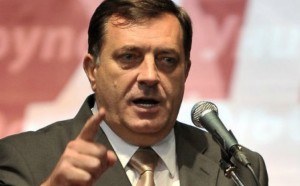CITIZENS’ MOTION

CITIZENS’ MOTION
to remove
Ambassador Johann Sattler
from office as
We, the undersigned citizens of Bosnia and Herzegovina call for the immediate dismissal of H. E. Johann Sattler from the position of Head of the Delegation of the European Union to Bosnia and Herzegovina and European Union Special Representative in Bosnia and Herzegovina. In the situation in which the values and principles fought for in the first half of the 20th century and the defence of the European borders might well be played out AGAIN in Bosnia and Herzegovina, we find it unacceptable to have Mr. Sattler continue his operation in the stated office.
Mr. Sattler’s term in office has been marked by a complete failure to respond to and insist on adherence to the very principles that are at the core of the European Union. Euroscepticism among the citizens has therefore been on the rise. His tenure will be remembered for its almost constant political crises, consistently described as the worst and most unstable period since the end of war, and marked by crosscutting blockages preventing the political functioning of this country, primarily – but not solely – on the state-level.
It is our belief that any substantial reform, primarily when it comes to electoral practices and amendments to the Constitution, must rest on securing the standards as set by the European Convention for the Protection of Human Rights and Fundamental Freedoms. We find it appalling to be compelled to remind not only the public of Bosnia and Herzegovina and its politicians so inaccurately referred to as “leaders”, but also institutional representatives of the European Union, its member states, and other representatives of the international community that the Constitution of Bosnia and Herzegovina is inspired by the Universal Declaration of Human Rights, the International Covenants on Civil and Political Rights and on Economic, Social and Cultural Rights, and the Declaration on the Rights of Persons Belonging to National or Ethnic, Religious and Linguistic Minorities, as well as other human rights instruments. The Constitution clearly states that the rights and freedoms set forth in the European Convention for the Protection of Human Rights and Fundamental Freedoms and its Protocols shall apply directly in Bosnia and Herzegovina, and that these shall have priority over all other law.
We believe that these principles, as well as other values which are the very essence of modern Europe, set forth by all legal instruments since 1949, mark the standards that Bosnia and Herzegovina as a post-war and post-genocidal society needs to strive for, regardless of any potential changes to the current constitution as formulated in the Dayton Agreement. It is on these grounds that the European Court for Human Rights has made its rulings that remain relevant for the political reform in Bosnia and Herzegovina, of which the verdict in the Zornić case is to be considered crucial and elemental in any attempts for constitutional and electoral reforms.
It is our firm belief that the actions undertaken by Mr. Sattler have only added to the societal tensions in terms of feeding and deepening a well-worn political mantra which relies on the magnification and instrumentalization of purported ethnic divisions, but is clearly aimed at enabling nationalist political party manipulation of governing structures. Ever since clumsily declaring Dragan Čović as “champion of European integration”, Mr. Sattler has demonstrated contempt for Bosnia and Herzegovina’s society. He has ignored its most active and consistent proponents of real European values by instrumentalizing citizens’ assemblies to inadequately discuss the intricacies of the Election Law to achieve a predetermined goal: achieving election law “reform” to satisfy Mr. Čović. His most recent obstructions with regard to imposing the solution for securing the financing for elections planned for October 2022, within the legally set deadlines (19 May 2022), are perfectly in character with his prior performance. Mr. Sattler’s engagement has consistently encouraged – and rewarded – the worst political appetites among the ruling “elites”.
Mr. Sattler’s approach was consistently marked by the appeasement and enabling of the destructive actions of Dragan Čović and Milorad Dodik in blocking the functioning of the institutions of Bosnia and Herzegovina. We had believed this approach would have to change, if for no other reason than the slow realisation that both Čović and Dodik’s actions are facilitating the destabilising interests of the Russian Federation in the region, especially after the onset of the Russian invasion of Ukraine. Sadly, we were wrong.
In addition, we perceive the EU Delegation to Bosnia and Herzegovina to have been wilfully ignoring the positive grounds for reform when it comes to the electoral procedures and the Constitution itself, as well as in other matters, including the Experts’ Report on Rule of Law issues in Bosnia and Herzegovina or the so-called “Priebe Report”. Instead, Mr. Sattler’s actions went in the direction of endorsing the “agreement” of “political leaders”, by meeting in hotels and restaurants, crudely deprecating the institutions of this country, not to mention the actual European values and principles. The same policy was then adopted by other envoys of the international community, a practice we find abhorrent. It reveals that the pieties about developing democracy and rule of law articulated by the EU and others mask a policy built around appeasing local power brokers. The damage done to EU – and indeed Western – reputations cannot be overstated.
Instead of developing into a modern European society, Bosnia and Herzegovina has been hijacked by its corrupt politicians who have every reason to avoid any substantial progress and rule of law, and who have created a narrative which is just an opposite – making Bosnia and Herzegovina a country in which being a citizen is turned into a derogatory status.
The activities of Mr. Sattler as the Head of the Delegation of the European Union to Bosnia and Herzegovina and the European Union Special Representative in Bosnia and Herzegovina have evidently – by default or design – enabled the efforts of hostile and illiberal internal and external political forces that are destructive towards this country. These can easily be seen as a mere continuation of the political programs of Serbia and Croatia – the former articulated by a Memorandum of the Serbian Academy of Sciences and Arts (1986) and which culminated in what was ruled by the International Criminal Tribunal for the former Yugoslavia to have been an act of genocide, and the latter having been ruled by the same Tribunal to have been a joint criminal enterprise. It is also worth noting that both these rulings were made after the Dayton Agreement and the Constitution of Bosnia and Herzegovina were adopted in 1995, thereby clarifying the position of Bosnia and Herzegovina at the time the peace accord and the blueprint for the country were made.
The “political elites” have wilfully misappropriated the representation of ethnic identities, betraying BiH’s long history and tradition of diversity and openness, including by deliberately distorting the notion of “constituent” in a way that excludes the possibility of real citizenship. The term “constitutiveness” is a mistranslation, obsolete and contrary to the values set out in EU and other conventions. And the latest innovation – the notion of “legitimate political representation of ethnic communities” in the public and political sphere – has cynically crept into the political lexicon, despite its absence from the Constitution, being fundamentally at odds with the European Convention for the Protection of Human Rights and Fundamental Freedoms, and the verdicts of the European Court for Human Rights. The fact that Mr. Sattler and by extension the EU itself have accepted this approach is shameful, as it has fostered an atmosphere of reactive ethnocentrism, and has had a negative impact on trust among the ethnic groups and towards the institutions of this country. It fully denies the right of citizenship by Citizens, and Others, in spite of their clean inclusion in the constitution.
And yet still Mr. Sattler has failed to react, even, as just one example, when he offered mere words of appeasement after a member of the Presidency was so confident in his impunity, and so hateful towards the country, that he denied the use of a helicopter to fight forest fires. This is considered to be acceptable “business as usual” now in a country where the EU’s “partners” speak and act in ways that would be considered treason in probably just any country apart from Bosnia and Herzegovina; and where they can hold the entire state blocked and captured in an attempt to blackmail the stakeholders to deliver favours of interest to a single political party and not the ethnic group it claims to represent. This is not diplomacy, but an expression of the low moral standards of all involved. That such an approach continues as the EU, US, UK, and rest of the democratic world has aligned to support Ukraine’s self-defence and articulation of democratic values and human dignity makes it all the more egregious.
We call for a shift in the policies of the European Union towards Bosnia and Herzegovina, to move away from actions that make the Union’s values into mere words, and instead insist on no less and no more but the actual implementation of the verdicts of the European Court for Human Rights, primarily the verdict in the Zornić case; the implementation of the recommendations of the Experts’ Report on Rule of Law issues in Bosnia and Herzegovina, and the path as set by the fourteen key priorities formulated in the Opinion of the European Commission, all having in mind the Stabilisation and Accession Agreement (SAA), and theEuropean Convention for the Protection of Human Rights and Fundamental Freedoms. If pursued with vision and energy, these could assist in the development of what this country needs – a new social contract. This would not only be in line with the EU’s stated values and founding principles, but would be in the interests of the EU and its citizens – indeed, the wider democratic world.
If, however, the EU assesses that Mr. Sattler has been effective in promoting reform and the EU’s values, that Bosnia is stronger today than when he arrived, and decides against sending a decent replacement for Mr. Sattler, then Brussels will need to realise that this approach will end up being costlier in the end, as there will continue to be nothing to deter the current attacks on European standards and values in Bosnia as well as the region as a whole. At the same time, we and others like us will have no choice but to follow the hundreds of thousands of our friends and relatives who have already left over the last couple of years, being unable to agree to continue to live under the savagery of local political “champions” and the international enablers, and being fed up with having our dignity still further undermined. We will have to seek these standards and values elsewhere, voting with our feet, and with much regret as no one should have to leave their home to live a life of dignity in a system that offers a fair and accountable social contract. If you don’t bring your standards to us, we will be forced to bring them – physically – to you.
- ReSTART, an informal group of citizens
- Association of Independent Intellectuals “Krug 99”
- Adil Kulenović, President of KRUG 99
- Professor David Pettigrew, Southern Connecticut State University, board member of the Bosnian American Genocide Research Center in Chicago
- Azra Zornić, civic activist
- Samir Beharić, BiH youth activist
- Elida Bešić, entrepreneur and member of the Board of the Bosnian Civic Initiative Stuttgart
- “We do not want a change in the Election Law” members of the FB group
- INITIATIVE 2017 – MOVEMENT for civil BiH members of the FB group
- Bosnian Citizens’ Initiative Stuttgart; President Nijaza Mešić; Vice President Izudina Velispahić
- BGV – Bosnian Civic Council; Dr. Ervin Sendijarević
- NAUK – Bosnian Scientific Art Club in the Netherlands
- BOSNIAN MOVEMENT – An informal FB group of over a thousand BiH citizens
- BADN – Bosnian Academic Society Frankfurt; Presidency of the society – Azim Čaušević, Pejo Katić and Husein Peratović








